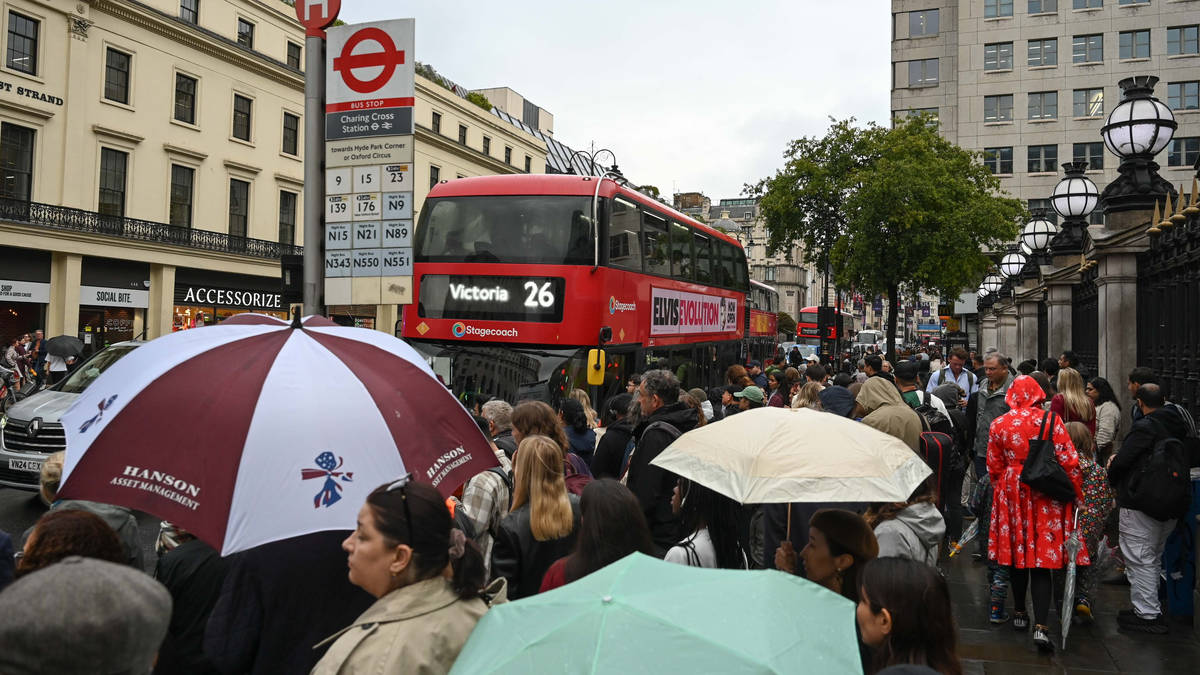Londoners are seen waiting for a bus under the rain as tube workers go on strike on September 10, 2025.
Picture:
Getty
Talks will be held on Wednesday in a bid to resolve a dispute which led to the Tube strikes last week, bringing the city to a standstill and causing chaos for commuters.
Members of the Rail, Maritime and Transport union (RMT) walked out from their jobs at London Underground (LU) last week, stopping most Tube services dead in their tracks for much of the week.
Millions of commuters, tourists and other visitors to the capital suffered travel chaos, with many turning to bikes, buses or taxis to travel.
RMT leaders will meet with LU officials on Wednesday, raising hopes of a deal.
The RMT’s general secretary Eddie Dempsey said his union is “hopeful” of a deal, but warned bosses against giving workers the “cold shoulder”.
Read more: UK inflation remains at 3.8% but food price rises accelerate for another month
Read more: At least 1,147 died from climate-driven heat in UK this summer, scientists find
Commuters cross London Bridge early in the morning of September 8, 2025.
Picture:
Getty
The union has signalled acceptance of a 3.4% pay offer, but the dispute over working hours remains.
The RMT is campaigning for a cut in the working week from 35 to 32 hours, warning its members are suffering from fatigue because of shift patterns and reductions in staff numbers.
London Underground has previously said the cut in hours would be unaffordable and has denied there are fewer staff on the Underground.
General secretary Eddie Dempsey has said the union is prepared to negotiate a timescale for a cut in hours rather than achieve it immediately, after saying last week that industrial relations on the Underground had “totally collapsed”.
“I am hopeful, I’m almost optimistic but I’ve seen a few negotiations go wrong. I think we’ll make some progress in these discussions,” Mr Dempsey told the BBC.
He added: “I think it would be remarkably foolish if we get the cold shoulder at the first meeting from TfL.
Commuters battle through Westminster on bikes at rush hour on September 09, 2025.
Picture:
Getty
“We’ll take our time with it, we’ll do the best we can to come to a reasonable settlement, we’ll consult our people and if we can get ourselves into a position where there’s a compromise that works on both sides then we’ll settle.”
“We don’t want to come back out into strike action but if this all collapses and we turn up for the talks and get the cold shoulder and there’s no progress, no movements, I’ll have to go back to my members and ask them what they want to do next and the answer is probably more strike action.”
One estimate said last week’s strikes cost the economy £230 million. This figure reportedly reflects the loss of roughly 700,000 working days across both TfL staff and the wider commuter base.
The hospitality sector was most severely affected, with bars and restaurants having to close early because of a lack of customers.
The RMT’s 43-year-old boss tried to reassure those travelling in and out of the capital, saying the union wants to “settle deals”.
Mr Dempsey told the broadcaster: “Londoners can rest assured: you only see us when we’re on strike but the majority of things we do is settle deals.
“We’re a union that makes deals everywhere and we’ve settled hundreds of pay claims this year and this just happens to be one where we’ve hit the buffers.”
